International Trade Finance and Investment in the UK Economy
VerifiedAdded on 2022/12/30
|17
|4166
|97
Report
AI Summary
This report provides an in-depth analysis of international trade finance and investment within the context of the UK economy. It begins with an executive summary and explores the background of the financial market, detailing the allocation of capital both domestically and internationally. The report examines the roles of financial institutions, central banks, FDI, the World Bank, and the IMF in capital allocation. It then evaluates the UK economy, covering GDP, inflation, monetary and fiscal policies, and the poverty index. A critical evaluation of the challenges posed by industrialization and trade policies is presented, followed by conclusions and recommendations for future growth and stability. The report references various sources to support its findings, offering a comprehensive understanding of the subject.
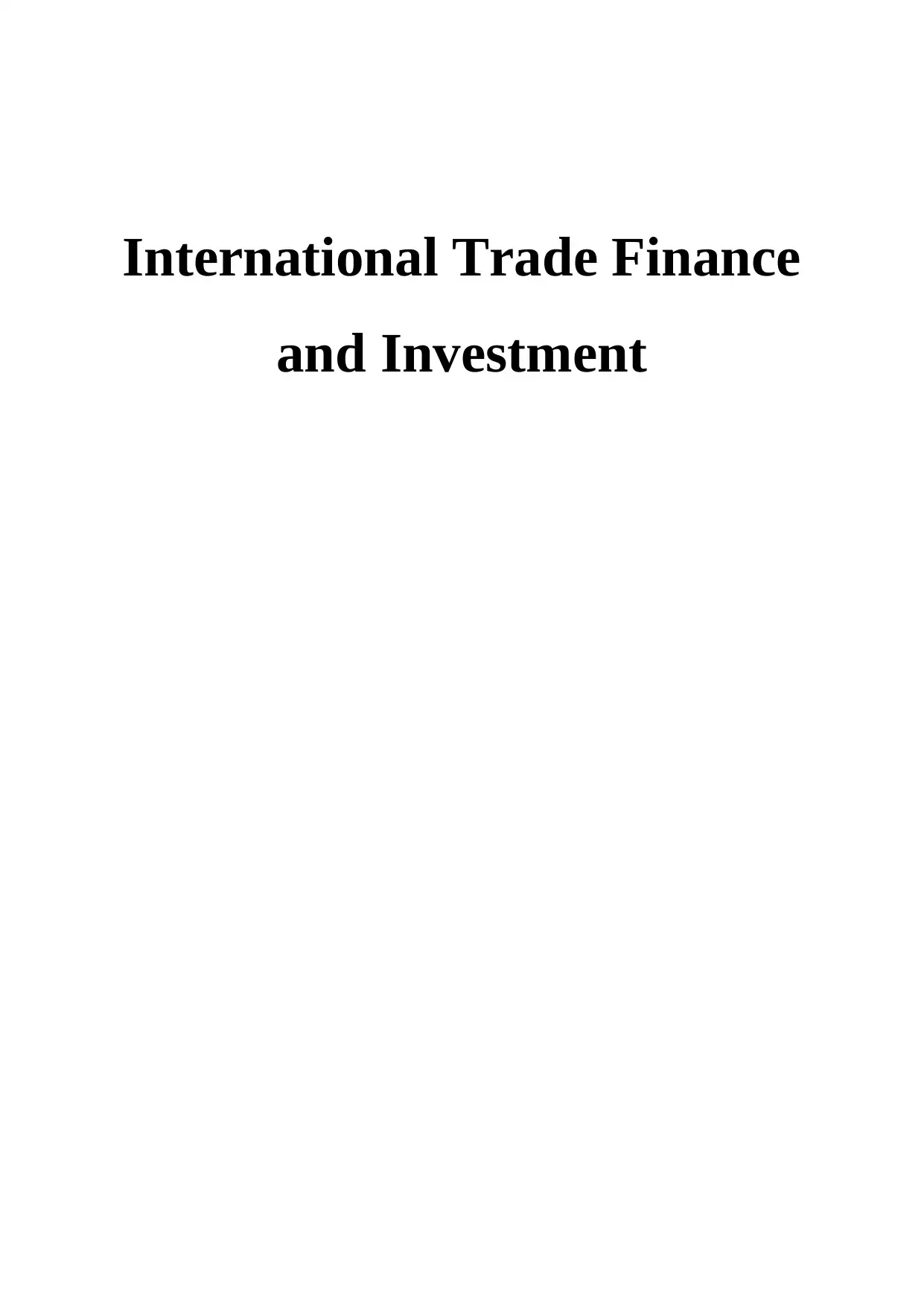
International Trade Finance
and Investment
and Investment
Paraphrase This Document
Need a fresh take? Get an instant paraphrase of this document with our AI Paraphraser
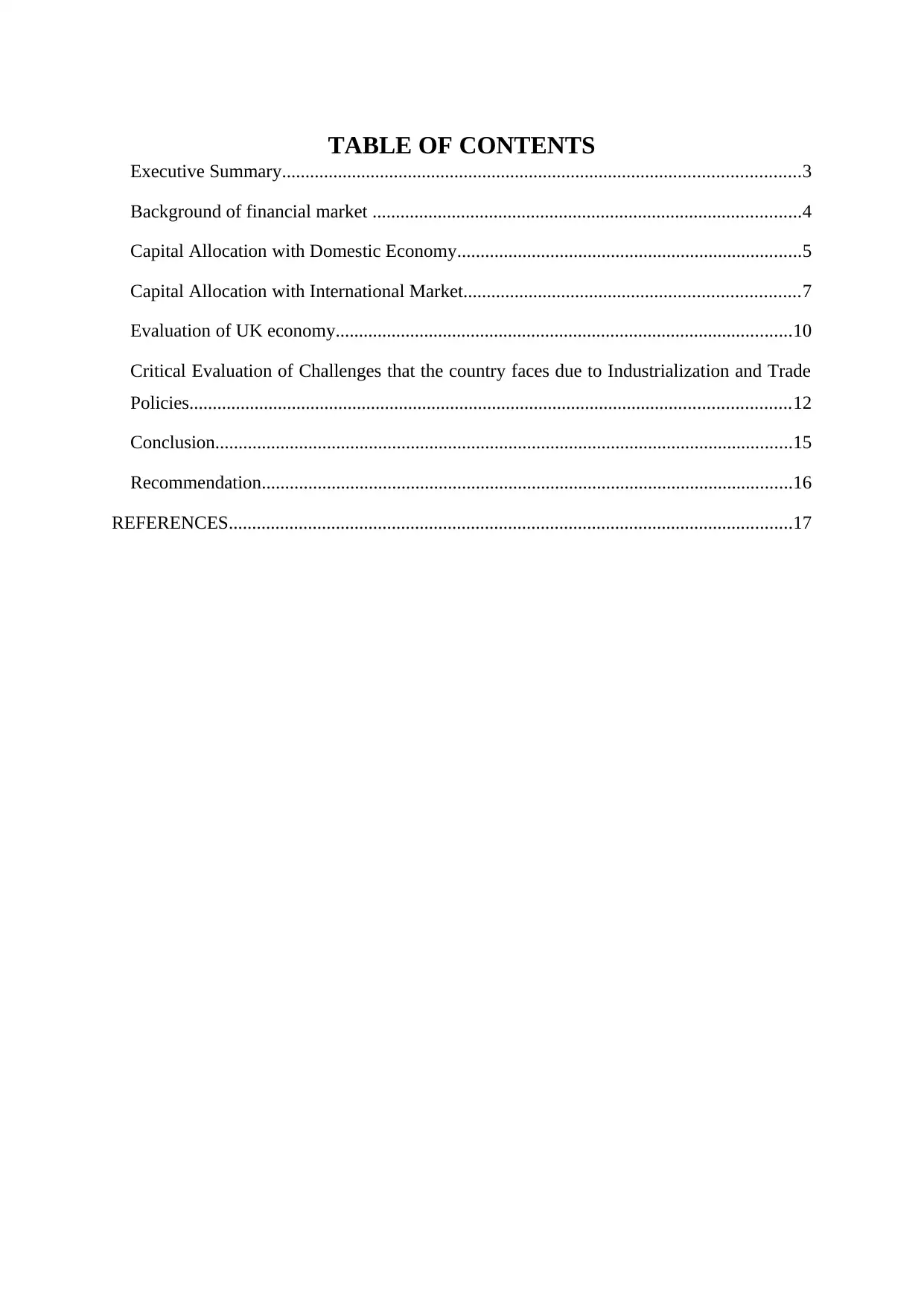
TABLE OF CONTENTS
Executive Summary...............................................................................................................3
Background of financial market ............................................................................................4
Capital Allocation with Domestic Economy..........................................................................5
Capital Allocation with International Market........................................................................7
Evaluation of UK economy..................................................................................................10
Critical Evaluation of Challenges that the country faces due to Industrialization and Trade
Policies.................................................................................................................................12
Conclusion............................................................................................................................15
Recommendation..................................................................................................................16
REFERENCES.........................................................................................................................17
Executive Summary...............................................................................................................3
Background of financial market ............................................................................................4
Capital Allocation with Domestic Economy..........................................................................5
Capital Allocation with International Market........................................................................7
Evaluation of UK economy..................................................................................................10
Critical Evaluation of Challenges that the country faces due to Industrialization and Trade
Policies.................................................................................................................................12
Conclusion............................................................................................................................15
Recommendation..................................................................................................................16
REFERENCES.........................................................................................................................17
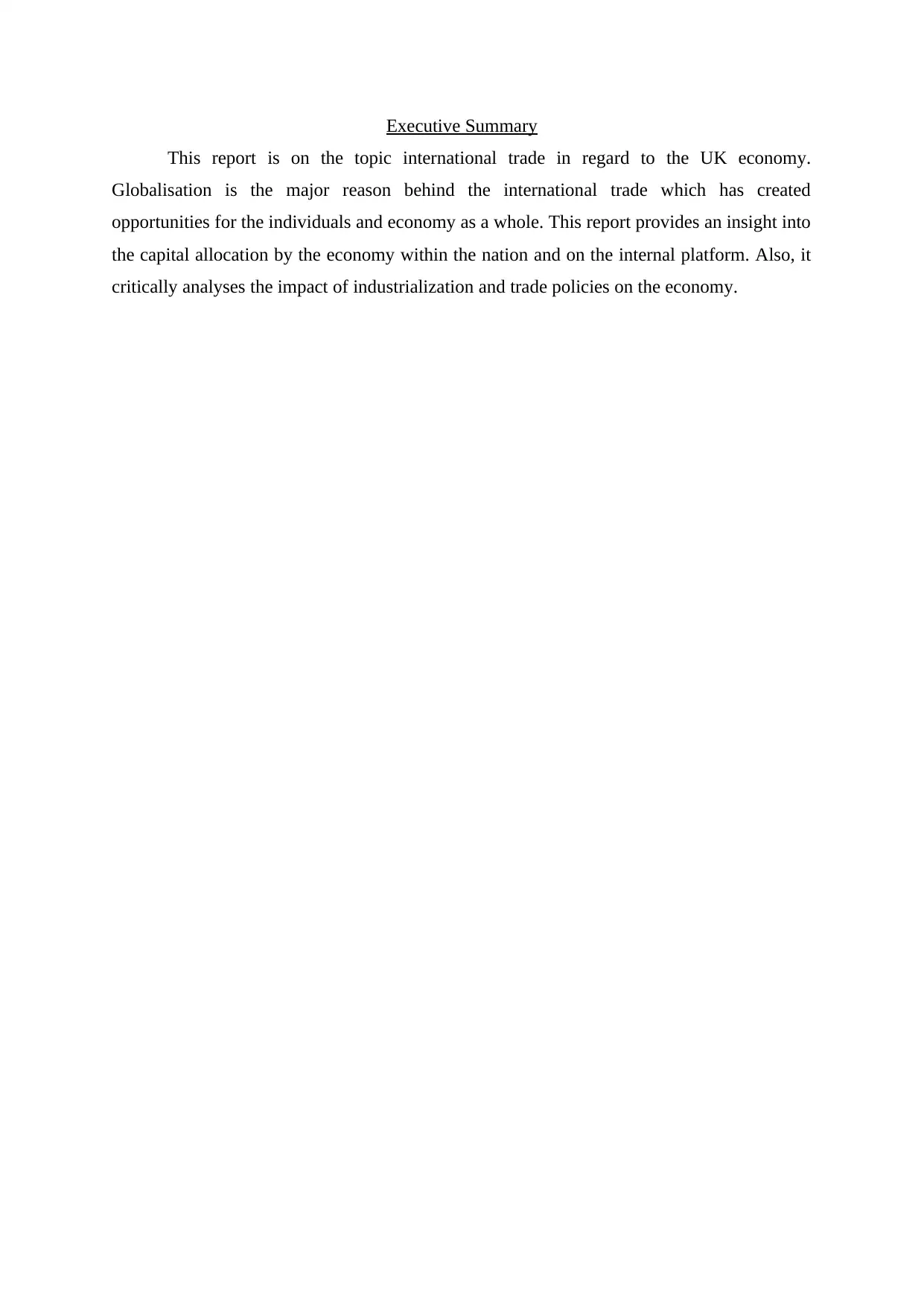
Executive Summary
This report is on the topic international trade in regard to the UK economy.
Globalisation is the major reason behind the international trade which has created
opportunities for the individuals and economy as a whole. This report provides an insight into
the capital allocation by the economy within the nation and on the internal platform. Also, it
critically analyses the impact of industrialization and trade policies on the economy.
This report is on the topic international trade in regard to the UK economy.
Globalisation is the major reason behind the international trade which has created
opportunities for the individuals and economy as a whole. This report provides an insight into
the capital allocation by the economy within the nation and on the internal platform. Also, it
critically analyses the impact of industrialization and trade policies on the economy.
⊘ This is a preview!⊘
Do you want full access?
Subscribe today to unlock all pages.

Trusted by 1+ million students worldwide
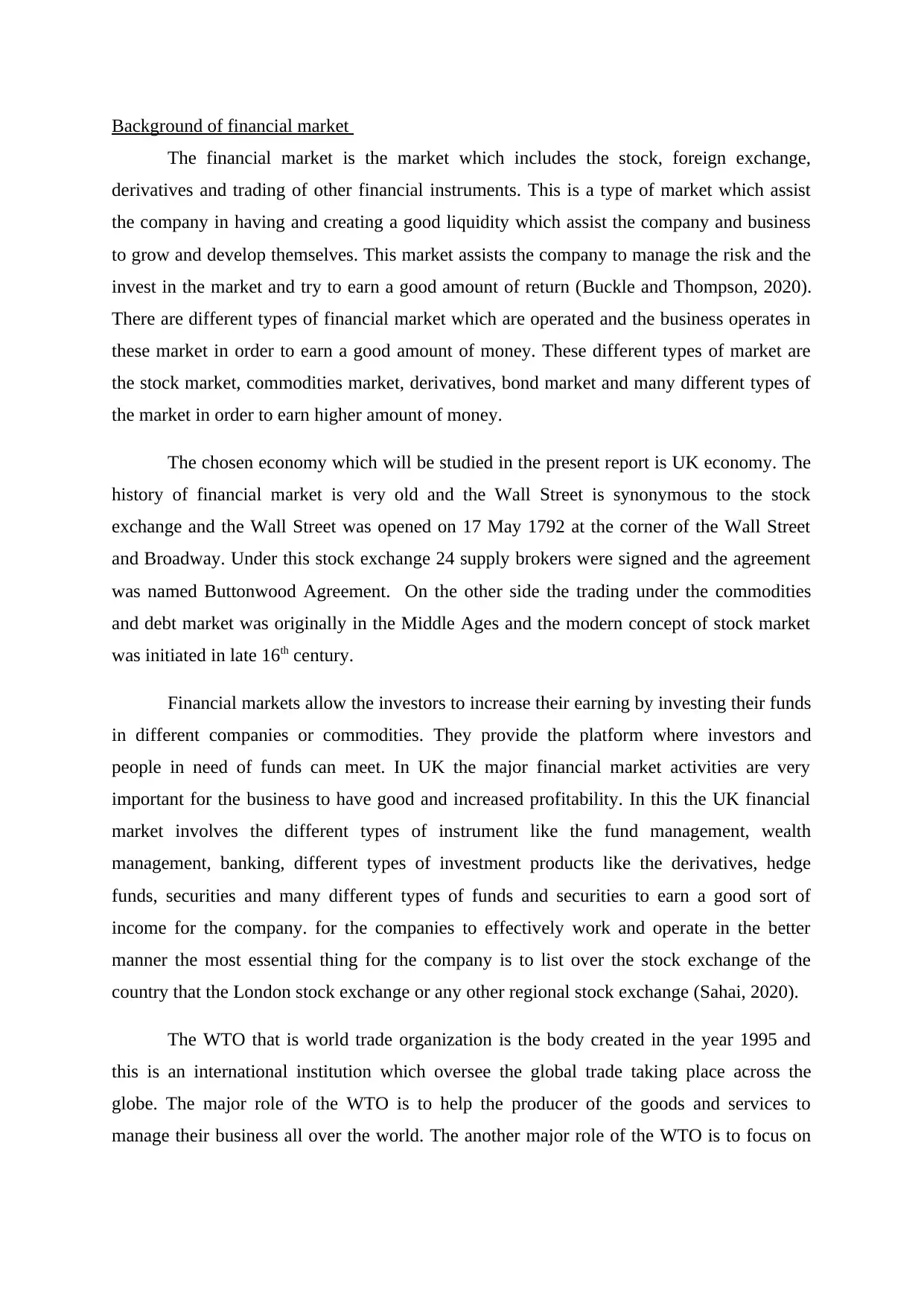
Background of financial market
The financial market is the market which includes the stock, foreign exchange,
derivatives and trading of other financial instruments. This is a type of market which assist
the company in having and creating a good liquidity which assist the company and business
to grow and develop themselves. This market assists the company to manage the risk and the
invest in the market and try to earn a good amount of return (Buckle and Thompson, 2020).
There are different types of financial market which are operated and the business operates in
these market in order to earn a good amount of money. These different types of market are
the stock market, commodities market, derivatives, bond market and many different types of
the market in order to earn higher amount of money.
The chosen economy which will be studied in the present report is UK economy. The
history of financial market is very old and the Wall Street is synonymous to the stock
exchange and the Wall Street was opened on 17 May 1792 at the corner of the Wall Street
and Broadway. Under this stock exchange 24 supply brokers were signed and the agreement
was named Buttonwood Agreement. On the other side the trading under the commodities
and debt market was originally in the Middle Ages and the modern concept of stock market
was initiated in late 16th century.
Financial markets allow the investors to increase their earning by investing their funds
in different companies or commodities. They provide the platform where investors and
people in need of funds can meet. In UK the major financial market activities are very
important for the business to have good and increased profitability. In this the UK financial
market involves the different types of instrument like the fund management, wealth
management, banking, different types of investment products like the derivatives, hedge
funds, securities and many different types of funds and securities to earn a good sort of
income for the company. for the companies to effectively work and operate in the better
manner the most essential thing for the company is to list over the stock exchange of the
country that the London stock exchange or any other regional stock exchange (Sahai, 2020).
The WTO that is world trade organization is the body created in the year 1995 and
this is an international institution which oversee the global trade taking place across the
globe. The major role of the WTO is to help the producer of the goods and services to
manage their business all over the world. The another major role of the WTO is to focus on
The financial market is the market which includes the stock, foreign exchange,
derivatives and trading of other financial instruments. This is a type of market which assist
the company in having and creating a good liquidity which assist the company and business
to grow and develop themselves. This market assists the company to manage the risk and the
invest in the market and try to earn a good amount of return (Buckle and Thompson, 2020).
There are different types of financial market which are operated and the business operates in
these market in order to earn a good amount of money. These different types of market are
the stock market, commodities market, derivatives, bond market and many different types of
the market in order to earn higher amount of money.
The chosen economy which will be studied in the present report is UK economy. The
history of financial market is very old and the Wall Street is synonymous to the stock
exchange and the Wall Street was opened on 17 May 1792 at the corner of the Wall Street
and Broadway. Under this stock exchange 24 supply brokers were signed and the agreement
was named Buttonwood Agreement. On the other side the trading under the commodities
and debt market was originally in the Middle Ages and the modern concept of stock market
was initiated in late 16th century.
Financial markets allow the investors to increase their earning by investing their funds
in different companies or commodities. They provide the platform where investors and
people in need of funds can meet. In UK the major financial market activities are very
important for the business to have good and increased profitability. In this the UK financial
market involves the different types of instrument like the fund management, wealth
management, banking, different types of investment products like the derivatives, hedge
funds, securities and many different types of funds and securities to earn a good sort of
income for the company. for the companies to effectively work and operate in the better
manner the most essential thing for the company is to list over the stock exchange of the
country that the London stock exchange or any other regional stock exchange (Sahai, 2020).
The WTO that is world trade organization is the body created in the year 1995 and
this is an international institution which oversee the global trade taking place across the
globe. The major role of the WTO is to help the producer of the goods and services to
manage their business all over the world. The another major role of the WTO is to focus on
Paraphrase This Document
Need a fresh take? Get an instant paraphrase of this document with our AI Paraphraser
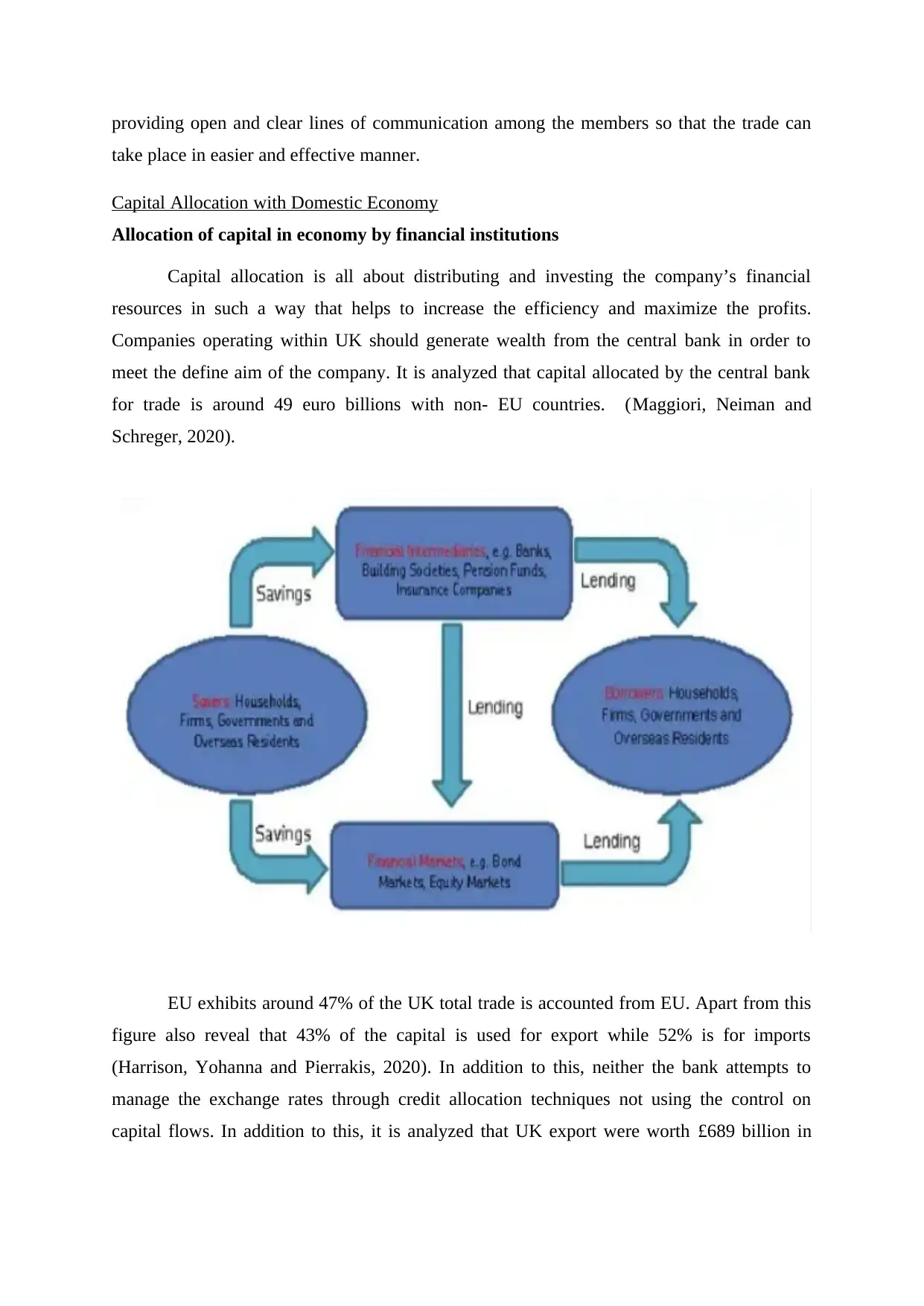
providing open and clear lines of communication among the members so that the trade can
take place in easier and effective manner.
Capital Allocation with Domestic Economy
Allocation of capital in economy by financial institutions
Capital allocation is all about distributing and investing the company’s financial
resources in such a way that helps to increase the efficiency and maximize the profits.
Companies operating within UK should generate wealth from the central bank in order to
meet the define aim of the company. It is analyzed that capital allocated by the central bank
for trade is around 49 euro billions with non- EU countries. (Maggiori, Neiman and
Schreger, 2020).
EU exhibits around 47% of the UK total trade is accounted from EU. Apart from this
figure also reveal that 43% of the capital is used for export while 52% is for imports
(Harrison, Yohanna and Pierrakis, 2020). In addition to this, neither the bank attempts to
manage the exchange rates through credit allocation techniques not using the control on
capital flows. In addition to this, it is analyzed that UK export were worth £689 billion in
take place in easier and effective manner.
Capital Allocation with Domestic Economy
Allocation of capital in economy by financial institutions
Capital allocation is all about distributing and investing the company’s financial
resources in such a way that helps to increase the efficiency and maximize the profits.
Companies operating within UK should generate wealth from the central bank in order to
meet the define aim of the company. It is analyzed that capital allocated by the central bank
for trade is around 49 euro billions with non- EU countries. (Maggiori, Neiman and
Schreger, 2020).
EU exhibits around 47% of the UK total trade is accounted from EU. Apart from this
figure also reveal that 43% of the capital is used for export while 52% is for imports
(Harrison, Yohanna and Pierrakis, 2020). In addition to this, neither the bank attempts to
manage the exchange rates through credit allocation techniques not using the control on
capital flows. In addition to this, it is analyzed that UK export were worth £689 billion in
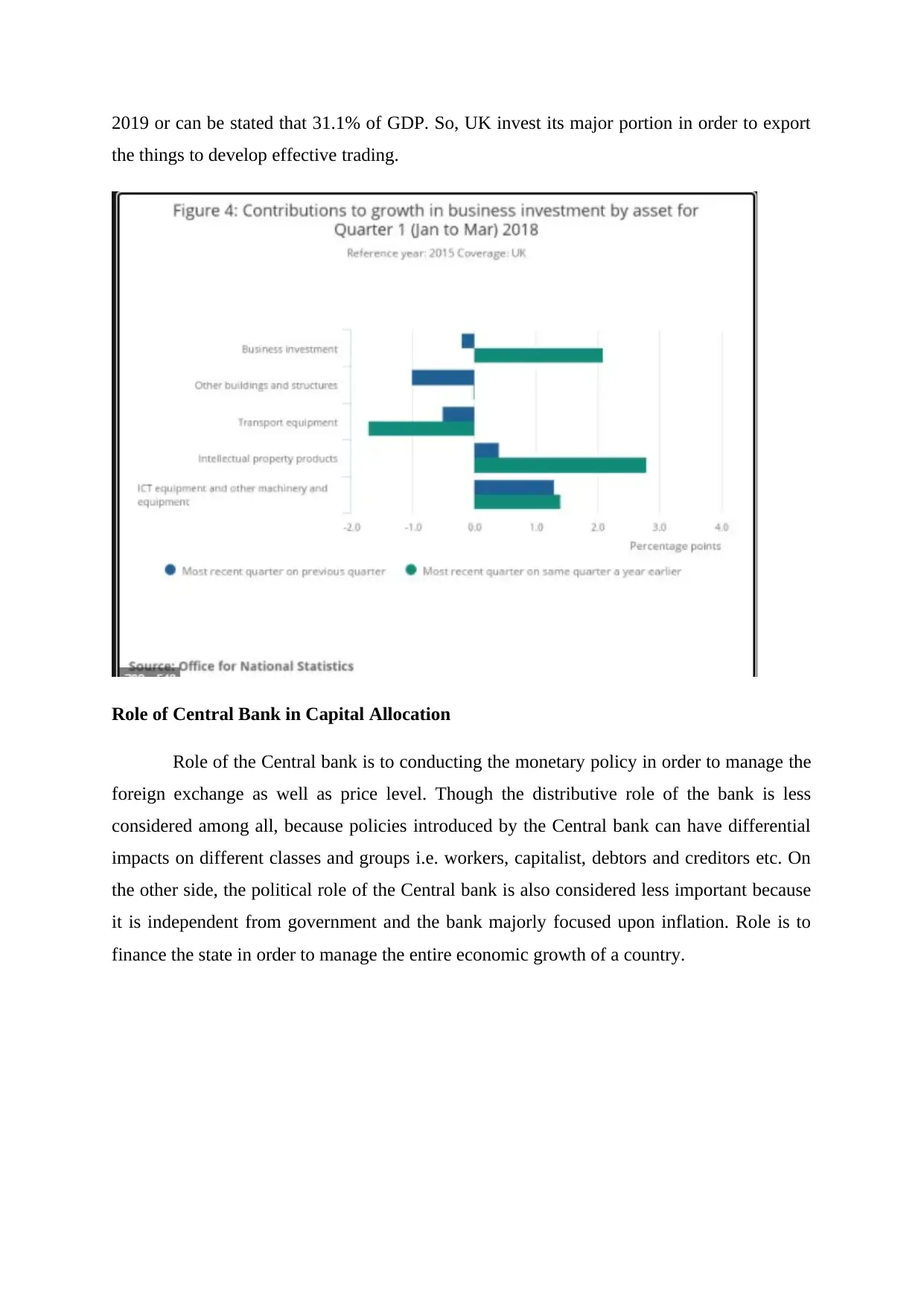
2019 or can be stated that 31.1% of GDP. So, UK invest its major portion in order to export
the things to develop effective trading.
Role of Central Bank in Capital Allocation
Role of the Central bank is to conducting the monetary policy in order to manage the
foreign exchange as well as price level. Though the distributive role of the bank is less
considered among all, because policies introduced by the Central bank can have differential
impacts on different classes and groups i.e. workers, capitalist, debtors and creditors etc. On
the other side, the political role of the Central bank is also considered less important because
it is independent from government and the bank majorly focused upon inflation. Role is to
finance the state in order to manage the entire economic growth of a country.
the things to develop effective trading.
Role of Central Bank in Capital Allocation
Role of the Central bank is to conducting the monetary policy in order to manage the
foreign exchange as well as price level. Though the distributive role of the bank is less
considered among all, because policies introduced by the Central bank can have differential
impacts on different classes and groups i.e. workers, capitalist, debtors and creditors etc. On
the other side, the political role of the Central bank is also considered less important because
it is independent from government and the bank majorly focused upon inflation. Role is to
finance the state in order to manage the entire economic growth of a country.
⊘ This is a preview!⊘
Do you want full access?
Subscribe today to unlock all pages.

Trusted by 1+ million students worldwide
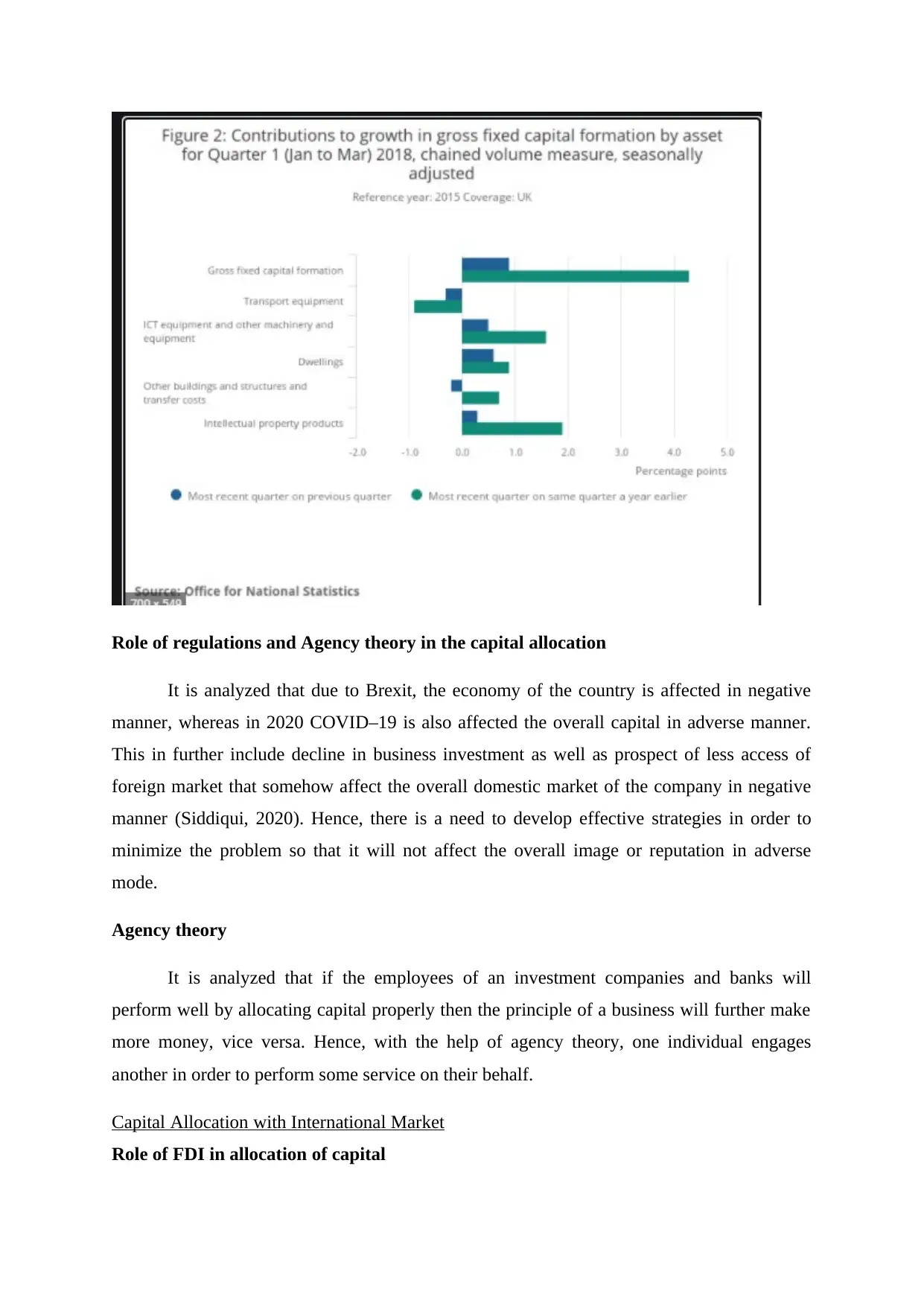
Role of regulations and Agency theory in the capital allocation
It is analyzed that due to Brexit, the economy of the country is affected in negative
manner, whereas in 2020 COVID–19 is also affected the overall capital in adverse manner.
This in further include decline in business investment as well as prospect of less access of
foreign market that somehow affect the overall domestic market of the company in negative
manner (Siddiqui, 2020). Hence, there is a need to develop effective strategies in order to
minimize the problem so that it will not affect the overall image or reputation in adverse
mode.
Agency theory
It is analyzed that if the employees of an investment companies and banks will
perform well by allocating capital properly then the principle of a business will further make
more money, vice versa. Hence, with the help of agency theory, one individual engages
another in order to perform some service on their behalf.
Capital Allocation with International Market
Role of FDI in allocation of capital
It is analyzed that due to Brexit, the economy of the country is affected in negative
manner, whereas in 2020 COVID–19 is also affected the overall capital in adverse manner.
This in further include decline in business investment as well as prospect of less access of
foreign market that somehow affect the overall domestic market of the company in negative
manner (Siddiqui, 2020). Hence, there is a need to develop effective strategies in order to
minimize the problem so that it will not affect the overall image or reputation in adverse
mode.
Agency theory
It is analyzed that if the employees of an investment companies and banks will
perform well by allocating capital properly then the principle of a business will further make
more money, vice versa. Hence, with the help of agency theory, one individual engages
another in order to perform some service on their behalf.
Capital Allocation with International Market
Role of FDI in allocation of capital
Paraphrase This Document
Need a fresh take? Get an instant paraphrase of this document with our AI Paraphraser
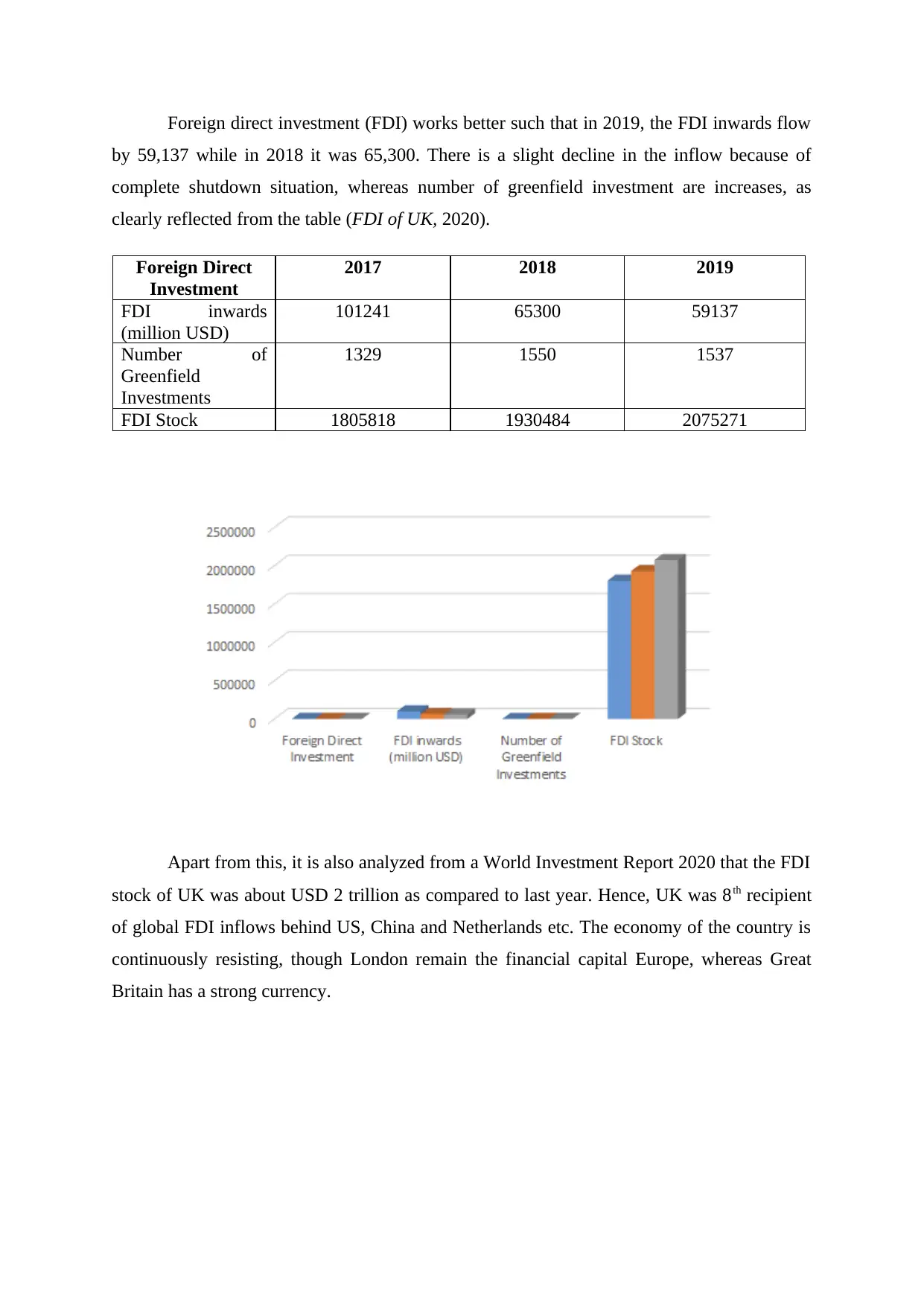
Foreign direct investment (FDI) works better such that in 2019, the FDI inwards flow
by 59,137 while in 2018 it was 65,300. There is a slight decline in the inflow because of
complete shutdown situation, whereas number of greenfield investment are increases, as
clearly reflected from the table (FDI of UK, 2020).
Foreign Direct
Investment
2017 2018 2019
FDI inwards
(million USD)
101241 65300 59137
Number of
Greenfield
Investments
1329 1550 1537
FDI Stock 1805818 1930484 2075271
Apart from this, it is also analyzed from a World Investment Report 2020 that the FDI
stock of UK was about USD 2 trillion as compared to last year. Hence, UK was 8th recipient
of global FDI inflows behind US, China and Netherlands etc. The economy of the country is
continuously resisting, though London remain the financial capital Europe, whereas Great
Britain has a strong currency.
by 59,137 while in 2018 it was 65,300. There is a slight decline in the inflow because of
complete shutdown situation, whereas number of greenfield investment are increases, as
clearly reflected from the table (FDI of UK, 2020).
Foreign Direct
Investment
2017 2018 2019
FDI inwards
(million USD)
101241 65300 59137
Number of
Greenfield
Investments
1329 1550 1537
FDI Stock 1805818 1930484 2075271
Apart from this, it is also analyzed from a World Investment Report 2020 that the FDI
stock of UK was about USD 2 trillion as compared to last year. Hence, UK was 8th recipient
of global FDI inflows behind US, China and Netherlands etc. The economy of the country is
continuously resisting, though London remain the financial capital Europe, whereas Great
Britain has a strong currency.
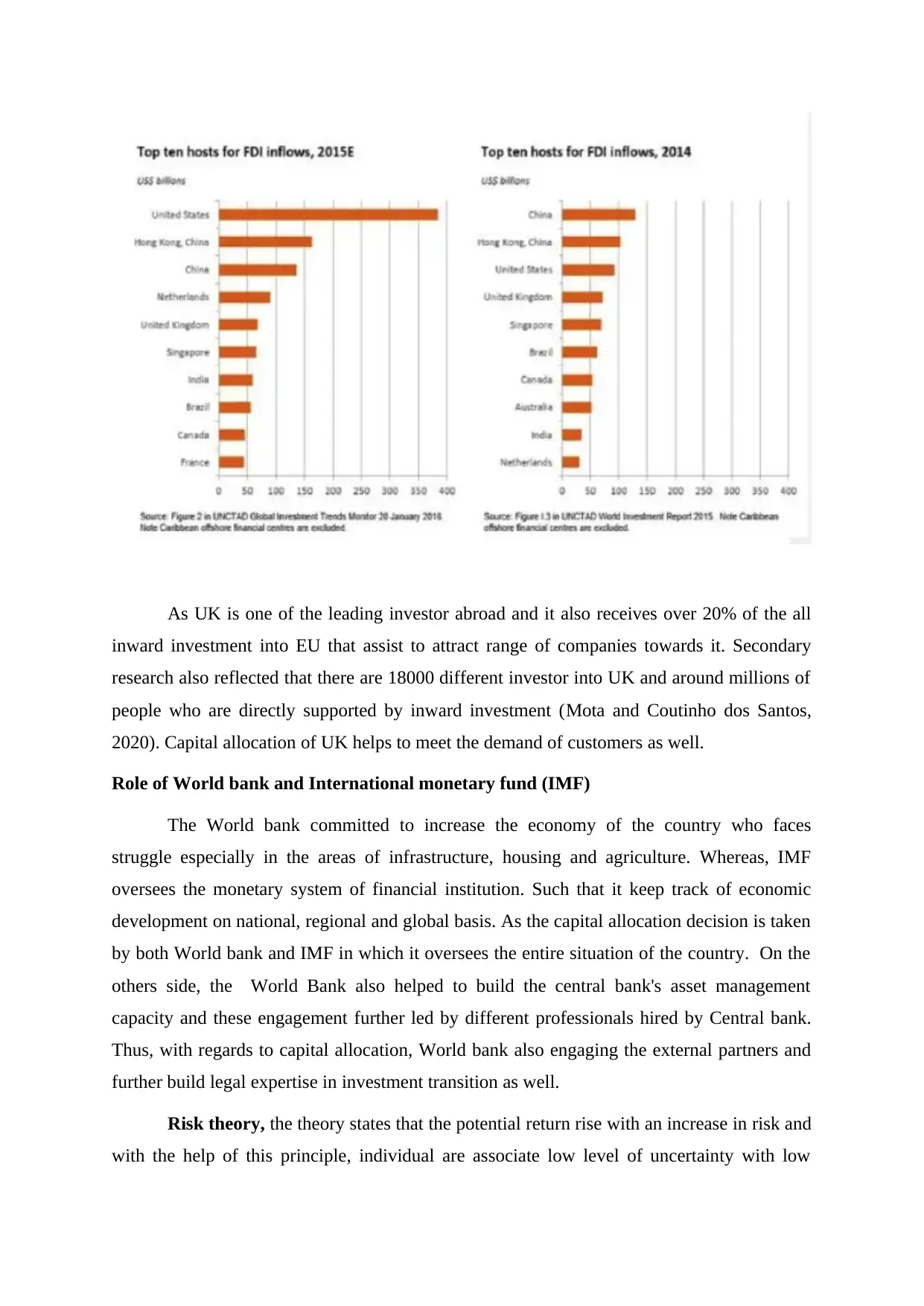
As UK is one of the leading investor abroad and it also receives over 20% of the all
inward investment into EU that assist to attract range of companies towards it. Secondary
research also reflected that there are 18000 different investor into UK and around millions of
people who are directly supported by inward investment (Mota and Coutinho dos Santos,
2020). Capital allocation of UK helps to meet the demand of customers as well.
Role of World bank and International monetary fund (IMF)
The World bank committed to increase the economy of the country who faces
struggle especially in the areas of infrastructure, housing and agriculture. Whereas, IMF
oversees the monetary system of financial institution. Such that it keep track of economic
development on national, regional and global basis. As the capital allocation decision is taken
by both World bank and IMF in which it oversees the entire situation of the country. On the
others side, the World Bank also helped to build the central bank's asset management
capacity and these engagement further led by different professionals hired by Central bank.
Thus, with regards to capital allocation, World bank also engaging the external partners and
further build legal expertise in investment transition as well.
Risk theory, the theory states that the potential return rise with an increase in risk and
with the help of this principle, individual are associate low level of uncertainty with low
inward investment into EU that assist to attract range of companies towards it. Secondary
research also reflected that there are 18000 different investor into UK and around millions of
people who are directly supported by inward investment (Mota and Coutinho dos Santos,
2020). Capital allocation of UK helps to meet the demand of customers as well.
Role of World bank and International monetary fund (IMF)
The World bank committed to increase the economy of the country who faces
struggle especially in the areas of infrastructure, housing and agriculture. Whereas, IMF
oversees the monetary system of financial institution. Such that it keep track of economic
development on national, regional and global basis. As the capital allocation decision is taken
by both World bank and IMF in which it oversees the entire situation of the country. On the
others side, the World Bank also helped to build the central bank's asset management
capacity and these engagement further led by different professionals hired by Central bank.
Thus, with regards to capital allocation, World bank also engaging the external partners and
further build legal expertise in investment transition as well.
Risk theory, the theory states that the potential return rise with an increase in risk and
with the help of this principle, individual are associate low level of uncertainty with low
⊘ This is a preview!⊘
Do you want full access?
Subscribe today to unlock all pages.

Trusted by 1+ million students worldwide
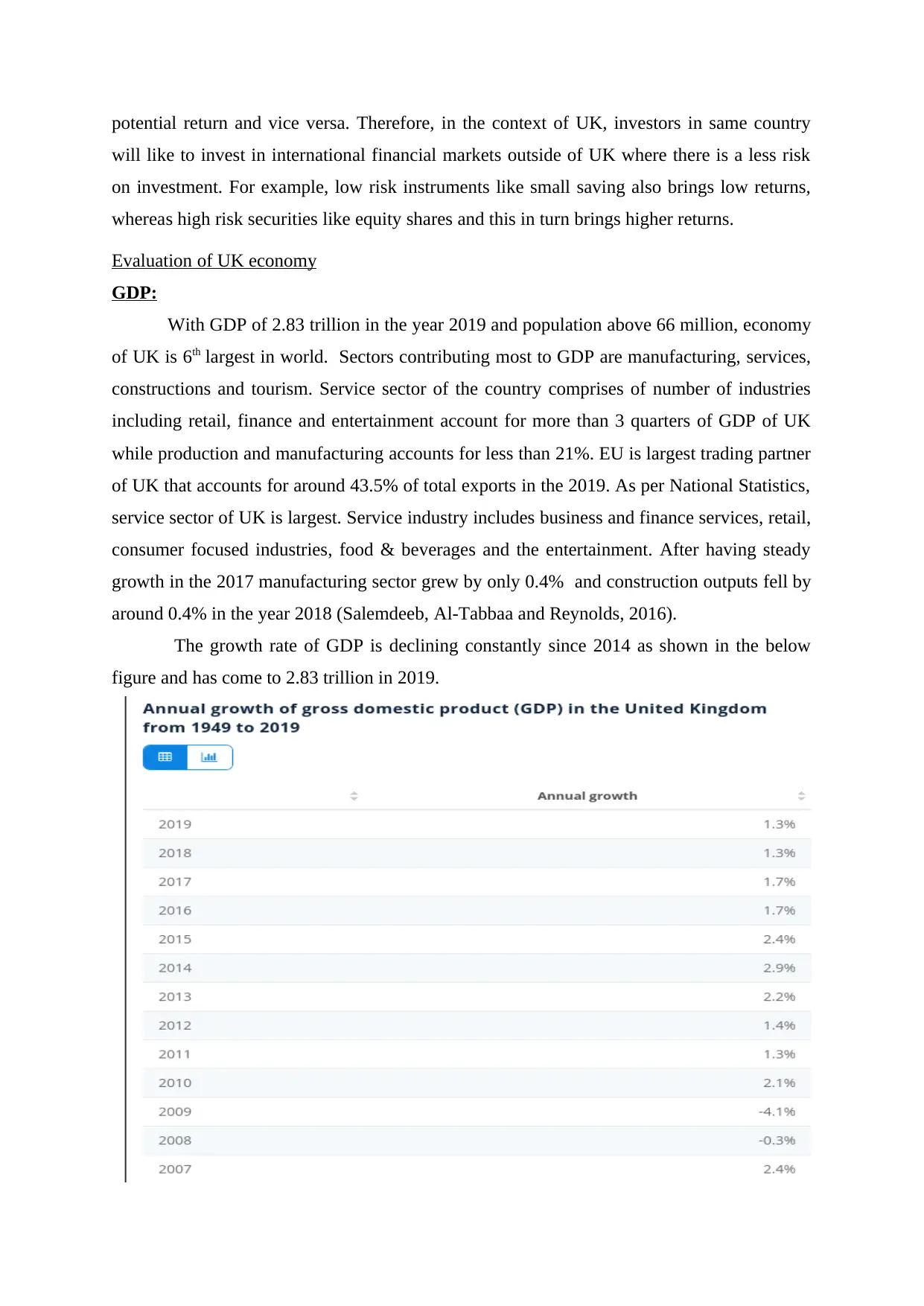
potential return and vice versa. Therefore, in the context of UK, investors in same country
will like to invest in international financial markets outside of UK where there is a less risk
on investment. For example, low risk instruments like small saving also brings low returns,
whereas high risk securities like equity shares and this in turn brings higher returns.
Evaluation of UK economy
GDP:
With GDP of 2.83 trillion in the year 2019 and population above 66 million, economy
of UK is 6th largest in world. Sectors contributing most to GDP are manufacturing, services,
constructions and tourism. Service sector of the country comprises of number of industries
including retail, finance and entertainment account for more than 3 quarters of GDP of UK
while production and manufacturing accounts for less than 21%. EU is largest trading partner
of UK that accounts for around 43.5% of total exports in the 2019. As per National Statistics,
service sector of UK is largest. Service industry includes business and finance services, retail,
consumer focused industries, food & beverages and the entertainment. After having steady
growth in the 2017 manufacturing sector grew by only 0.4% and construction outputs fell by
around 0.4% in the year 2018 (Salemdeeb, Al-Tabbaa and Reynolds, 2016).
The growth rate of GDP is declining constantly since 2014 as shown in the below
figure and has come to 2.83 trillion in 2019.
will like to invest in international financial markets outside of UK where there is a less risk
on investment. For example, low risk instruments like small saving also brings low returns,
whereas high risk securities like equity shares and this in turn brings higher returns.
Evaluation of UK economy
GDP:
With GDP of 2.83 trillion in the year 2019 and population above 66 million, economy
of UK is 6th largest in world. Sectors contributing most to GDP are manufacturing, services,
constructions and tourism. Service sector of the country comprises of number of industries
including retail, finance and entertainment account for more than 3 quarters of GDP of UK
while production and manufacturing accounts for less than 21%. EU is largest trading partner
of UK that accounts for around 43.5% of total exports in the 2019. As per National Statistics,
service sector of UK is largest. Service industry includes business and finance services, retail,
consumer focused industries, food & beverages and the entertainment. After having steady
growth in the 2017 manufacturing sector grew by only 0.4% and construction outputs fell by
around 0.4% in the year 2018 (Salemdeeb, Al-Tabbaa and Reynolds, 2016).
The growth rate of GDP is declining constantly since 2014 as shown in the below
figure and has come to 2.83 trillion in 2019.
Paraphrase This Document
Need a fresh take? Get an instant paraphrase of this document with our AI Paraphraser
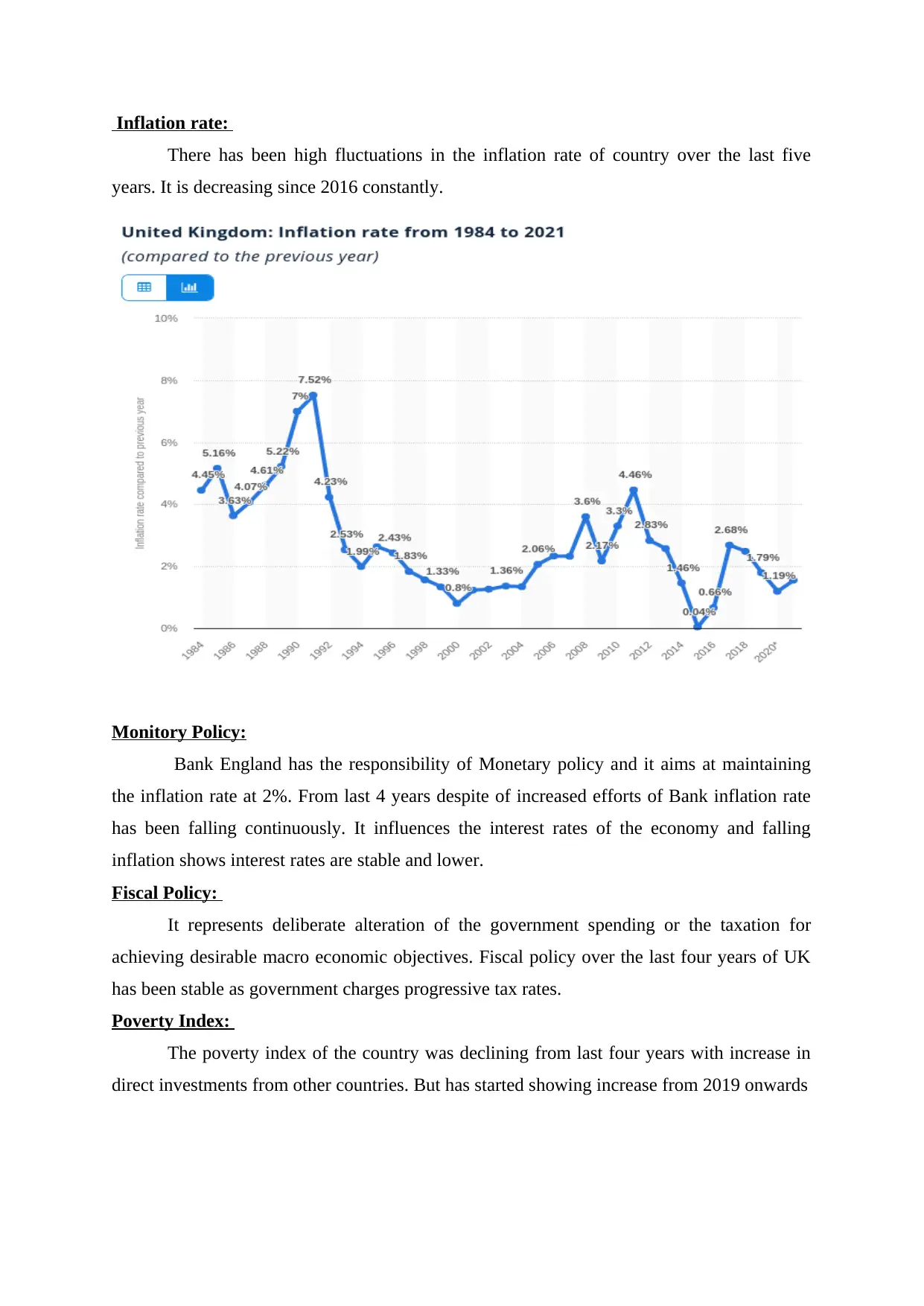
Inflation rate:
There has been high fluctuations in the inflation rate of country over the last five
years. It is decreasing since 2016 constantly.
Monitory Policy:
Bank England has the responsibility of Monetary policy and it aims at maintaining
the inflation rate at 2%. From last 4 years despite of increased efforts of Bank inflation rate
has been falling continuously. It influences the interest rates of the economy and falling
inflation shows interest rates are stable and lower.
Fiscal Policy:
It represents deliberate alteration of the government spending or the taxation for
achieving desirable macro economic objectives. Fiscal policy over the last four years of UK
has been stable as government charges progressive tax rates.
Poverty Index:
The poverty index of the country was declining from last four years with increase in
direct investments from other countries. But has started showing increase from 2019 onwards
There has been high fluctuations in the inflation rate of country over the last five
years. It is decreasing since 2016 constantly.
Monitory Policy:
Bank England has the responsibility of Monetary policy and it aims at maintaining
the inflation rate at 2%. From last 4 years despite of increased efforts of Bank inflation rate
has been falling continuously. It influences the interest rates of the economy and falling
inflation shows interest rates are stable and lower.
Fiscal Policy:
It represents deliberate alteration of the government spending or the taxation for
achieving desirable macro economic objectives. Fiscal policy over the last four years of UK
has been stable as government charges progressive tax rates.
Poverty Index:
The poverty index of the country was declining from last four years with increase in
direct investments from other countries. But has started showing increase from 2019 onwards
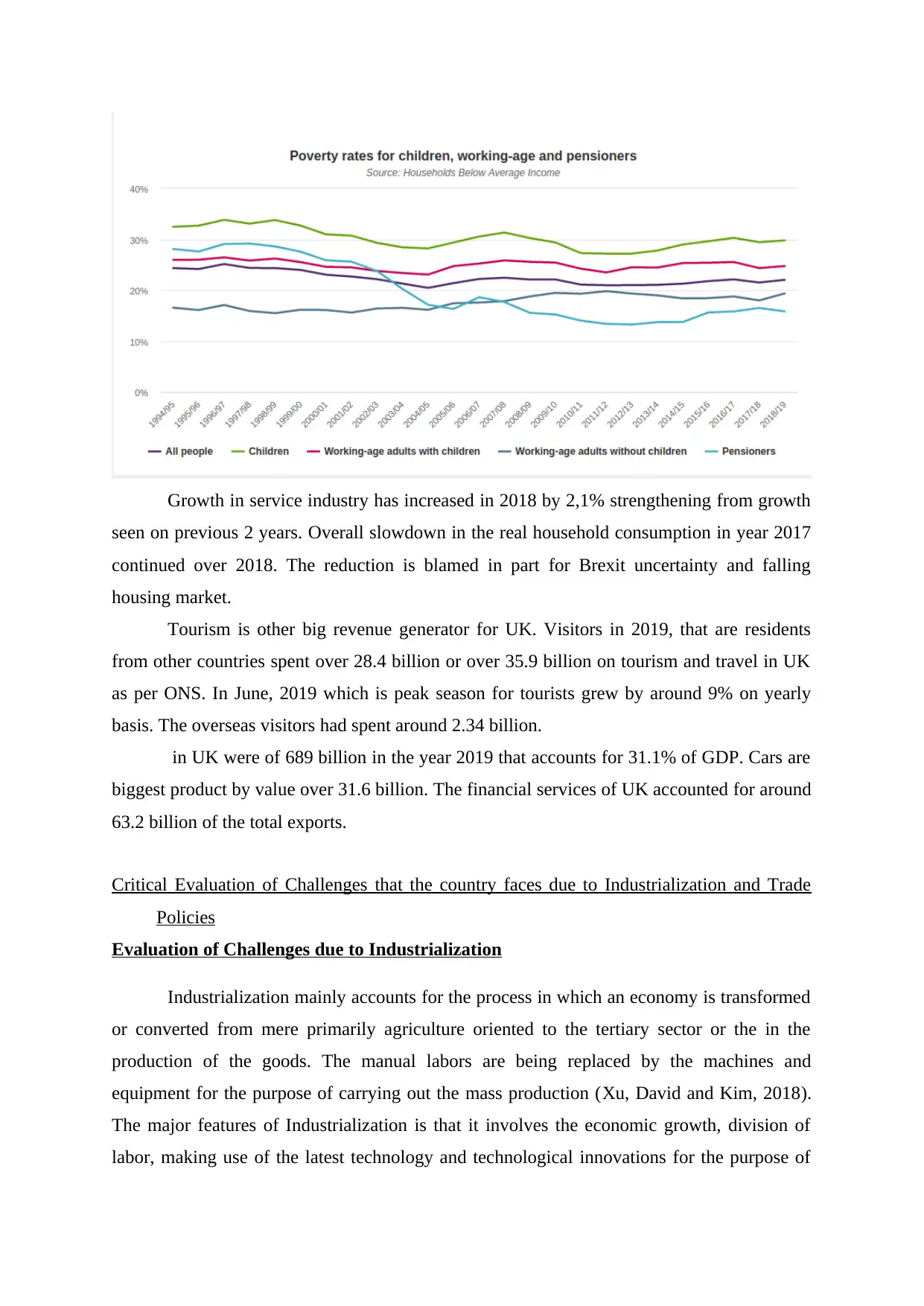
Growth in service industry has increased in 2018 by 2,1% strengthening from growth
seen on previous 2 years. Overall slowdown in the real household consumption in year 2017
continued over 2018. The reduction is blamed in part for Brexit uncertainty and falling
housing market.
Tourism is other big revenue generator for UK. Visitors in 2019, that are residents
from other countries spent over 28.4 billion or over 35.9 billion on tourism and travel in UK
as per ONS. In June, 2019 which is peak season for tourists grew by around 9% on yearly
basis. The overseas visitors had spent around 2.34 billion.
in UK were of 689 billion in the year 2019 that accounts for 31.1% of GDP. Cars are
biggest product by value over 31.6 billion. The financial services of UK accounted for around
63.2 billion of the total exports.
Critical Evaluation of Challenges that the country faces due to Industrialization and Trade
Policies
Evaluation of Challenges due to Industrialization
Industrialization mainly accounts for the process in which an economy is transformed
or converted from mere primarily agriculture oriented to the tertiary sector or the in the
production of the goods. The manual labors are being replaced by the machines and
equipment for the purpose of carrying out the mass production (Xu, David and Kim, 2018).
The major features of Industrialization is that it involves the economic growth, division of
labor, making use of the latest technology and technological innovations for the purpose of
seen on previous 2 years. Overall slowdown in the real household consumption in year 2017
continued over 2018. The reduction is blamed in part for Brexit uncertainty and falling
housing market.
Tourism is other big revenue generator for UK. Visitors in 2019, that are residents
from other countries spent over 28.4 billion or over 35.9 billion on tourism and travel in UK
as per ONS. In June, 2019 which is peak season for tourists grew by around 9% on yearly
basis. The overseas visitors had spent around 2.34 billion.
in UK were of 689 billion in the year 2019 that accounts for 31.1% of GDP. Cars are
biggest product by value over 31.6 billion. The financial services of UK accounted for around
63.2 billion of the total exports.
Critical Evaluation of Challenges that the country faces due to Industrialization and Trade
Policies
Evaluation of Challenges due to Industrialization
Industrialization mainly accounts for the process in which an economy is transformed
or converted from mere primarily agriculture oriented to the tertiary sector or the in the
production of the goods. The manual labors are being replaced by the machines and
equipment for the purpose of carrying out the mass production (Xu, David and Kim, 2018).
The major features of Industrialization is that it involves the economic growth, division of
labor, making use of the latest technology and technological innovations for the purpose of
⊘ This is a preview!⊘
Do you want full access?
Subscribe today to unlock all pages.

Trusted by 1+ million students worldwide
1 out of 17
Related Documents
Your All-in-One AI-Powered Toolkit for Academic Success.
+13062052269
info@desklib.com
Available 24*7 on WhatsApp / Email
![[object Object]](/_next/static/media/star-bottom.7253800d.svg)
Unlock your academic potential
Copyright © 2020–2026 A2Z Services. All Rights Reserved. Developed and managed by ZUCOL.




